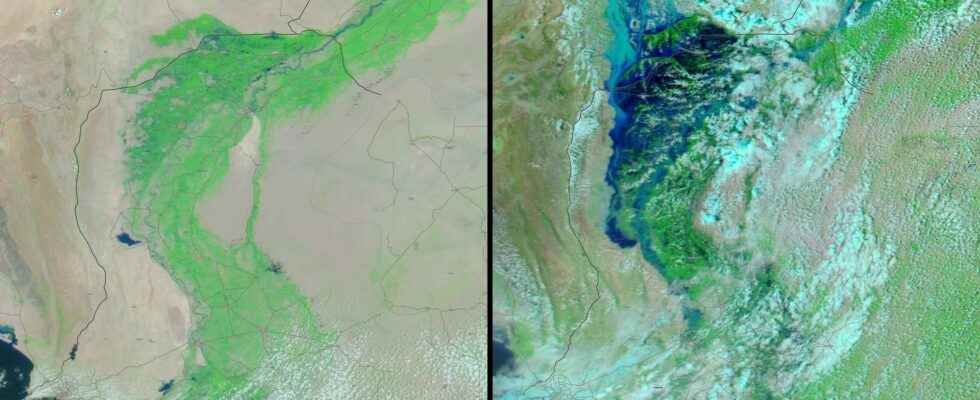You will also be interested
[EN VIDÉO] 5 weather phenomena that will become more frequent due to climate change Weather hazards have always been part of our daily lives. But with climate change, these once exceptional events tend to repeat themselves. Here are 5 weather phenomena that we will experience more often in the coming decades.
They are the worst floods that pakistan have ever known. Already tens of millions of people evacuated, without any resources, more than 1,200 dead, while a third of the country is under water. A balance sheet which should increase in the coming days, because for the moment the whole country is overwhelmed and the extent of the damage remains difficult to assess. But what caused such floods ? According to researchers, it was a mixture of climatic events that caused a chain reaction, with of course global warming in the first place.
Unusual drought from April and May
As of April, in fact, the temperature in Pakistan has greatly exceeded normal season around 30-35°C, and for several days exceeded 40°C in many places. Worse still, in the city of Jacobabad, the mercury has climbed to 51°Cunheard of in thenorthern hemisphere until this year! “These were not waves of heat normal, they were the worst in the world. We had the hottest place on Earth in Pakistan”explains Malik Amin Aslam in a press release Natureformer climate change minister, based in Islamabad.
And these extreme heat waves do not bode well. L’air warmer, less dense than cold air, can therefore retain more moisture. Stored water which can all the more be released into theatmosphere once the rainy season has started. Thus, above normal levels of rain were already forecast. Moreover, the drought of the air leads, of course, to a soil drought. The latter then become more compact, absorb much less water than during a weather report normal. Thus, the water that arrives on these soils will tend to run off instead of infiltrating deep into the earth.
Flooding #Pakistan are appalling. How many hundreds of thousands of hectares of crops crossed by mudslides? Millions of tons of eroded earth?
It is a major agricultural disaster over 1000 km with repercussions over several years ???? pic.twitter.com/rMry3GNcIg— Dr. Serge Zaka (Dr. Zarge) (@SergeZaka) September 1, 2022
But still other consequences of the drought were felt. The high mountain glaciers in the north of the country have melted, much more than usual due to the heat waves. Water was therefore already flowing from the mountains into the Indus, the largest river in the country which crosses it from north to south, when the floods arrived. However, this river feeds the cities, and the agricultural installations throughout Pakistan. And according to Zia Hashmi, a water resources engineer at Global Change Impact Studies Centerof the debits High levels of muddy water in the Hunza River, which feeds the Indus, were seen in July. An observation that suggests a melting fast and more intense than usual, and the possibility that some glacial lakes have broken their dams.
Floods such that a new lake has been created!
But that’s not all ! These floods also correspond with the arrival of an area of intense depression in the Arabian Sea in the south of the country, causing heavy rain in pakistan from June. “We rarely have large-scale depression systems that get there”explains Athar Hussain, climatologist at the University of Islamabad. All these events combined with an early monsoon which started at the end of June contributed to producing twice as many precipitation than average during the rainy season. Five times, in the southern provinces. So much so that a new lake has been created, although the rains are now over!
This lake will recede once the weather dries up, but may well stay for a few days to a few weeks. Just like the water that flows throughout the country and has already destroyed 240 bridges, 5,000 kilometers of roads and millions of homes. For this country, the worst is not over. Particularly prone to the effects of global warmingsuch occurrences could become the norm in Pakistan within a few years.
Interested in what you just read?
